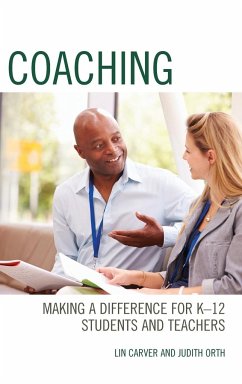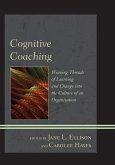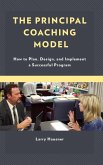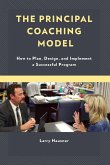- Gebundenes Buch
- Merkliste
- Auf die Merkliste
- Bewerten Bewerten
- Teilen
- Produkt teilen
- Produkterinnerung
- Produkterinnerung
Using scenarios and scholarly research this book follows a coach's journey from her first day as an instructional or academic coach through her experiences helping other new coaches.
Andere Kunden interessierten sich auch für
![Coaching Coaching]() Lin CarverCoaching39,99 €
Lin CarverCoaching39,99 €![Cognitive Coaching Cognitive Coaching]() Cognitive Coaching52,99 €
Cognitive Coaching52,99 €![The Principal Coaching Model The Principal Coaching Model]() Larry HausnerThe Principal Coaching Model59,99 €
Larry HausnerThe Principal Coaching Model59,99 €![The Principal Coaching Model The Principal Coaching Model]() Larry HausnerThe Principal Coaching Model32,99 €
Larry HausnerThe Principal Coaching Model32,99 €![The Legal and Policy Challenges of Student Dress and Grooming Codes The Legal and Policy Challenges of Student Dress and Grooming Codes]() Todd A. DemitchellThe Legal and Policy Challenges of Student Dress and Grooming Codes60,99 €
Todd A. DemitchellThe Legal and Policy Challenges of Student Dress and Grooming Codes60,99 €![Cool Things to Do If a Bully's Bugging You Cool Things to Do If a Bully's Bugging You]() Catherine DepinoCool Things to Do If a Bully's Bugging You82,99 €
Catherine DepinoCool Things to Do If a Bully's Bugging You82,99 €![Teacher as Traveler Teacher as Traveler]() Kenneth CushnerTeacher as Traveler80,99 €
Kenneth CushnerTeacher as Traveler80,99 €-
-
-
Using scenarios and scholarly research this book follows a coach's journey from her first day as an instructional or academic coach through her experiences helping other new coaches.
Hinweis: Dieser Artikel kann nur an eine deutsche Lieferadresse ausgeliefert werden.
Hinweis: Dieser Artikel kann nur an eine deutsche Lieferadresse ausgeliefert werden.
Produktdetails
- Produktdetails
- Verlag: Rowman & Littlefield Publishers
- Seitenzahl: 202
- Erscheinungstermin: 9. Mai 2017
- Englisch
- Abmessung: 235mm x 157mm x 17mm
- Gewicht: 486g
- ISBN-13: 9781475833003
- ISBN-10: 1475833008
- Artikelnr.: 47369331
- Herstellerkennzeichnung
- Libri GmbH
- Europaallee 1
- 36244 Bad Hersfeld
- gpsr@libri.de
- Verlag: Rowman & Littlefield Publishers
- Seitenzahl: 202
- Erscheinungstermin: 9. Mai 2017
- Englisch
- Abmessung: 235mm x 157mm x 17mm
- Gewicht: 486g
- ISBN-13: 9781475833003
- ISBN-10: 1475833008
- Artikelnr.: 47369331
- Herstellerkennzeichnung
- Libri GmbH
- Europaallee 1
- 36244 Bad Hersfeld
- gpsr@libri.de
Lin Carver, Ph. D, is a professor, literacy coach, author, and presenter with over 40 years of experience at the K-12 and the university level in both face to face and online formats. Dr. Carver is the Reading Program Administrator at Saint Leo University where she has been for the past seven years. She is active supporting the local K-12 school district and literacy associations, conducting research in the areas of literacy, technology, and student engagement, and presenting both nationally and internationally. Judith A. Orth, Ph.D., is a pedagogical professional with over 45 years of experience in public and higher education. She has a plentitude of publications and educational experience in the elementary/middle school classroom, public school administrator, university professor and university administrator, in both land and online academic institutions. Dr. Orth has presented at conferences, workshops and seminars and has been affiliated with Walden University for over 12 years. She is very active in local literacy foundations as well as national reading/educational associations.
Chapter 1 What is coaching? Six Definitions of Coaching Coaching is
Voluntary Approaches to Coaching What is a Growth Mindset? Developing a
Growth Mindset Hindrances to a Growth Mindset Staying Positive Around
Negative People Working Together SMART Goals Specific Goal Measurable Goal
Attainable Goal Realistic Goal Timely Goal Reflect and Apply Activities
References Chapter 2 Teacher Effectiveness Characteristics of Effective
Teachers as Determined by Teachers' Perception Characteristics of Effective
Teachers as Determined by Student Achievement Effective Coaches PBWorks
Characteristics of Effective Coaches Coaching and Supervision Coaching is
Not Supervision Components of Coaching Relationship Skills Leadership
Skills Content Area Skills Literacy Skills Assessment Skills Writing Skills
Differentiation Skills Adult Learning Skills Reflect and Apply Activities
References Chapter 3 Categories of Teachers Processing Information
Short-Term Memory Working Memory Increasing Working Memory Long-Term Memory
Moving Information from Short Term to Long Term Memory Self-Concept Humor
Teaching Implications Reflect and Apply Activities References Chapter 4
Leadership Characteristics Comparing Characteristics of Effective Coaches
Data Analysis Disaggregation Trend Cohort Longitudinal Data Provides the
Basis for the Coaching Process Professional Development Adult Learners
Learning Improves our Brain Long-Term Memory Types of Long-Term Memory
Declarative Memory Non-Declarative Memory Application Reflect and Apply
Activities References Chapter 5 Learning Climate Retention Rote Rehearsal
Elaborative Rehearsal Serial Position Effect Instructional Methods
Multisensory Approaches Learning and Motor Skills Factors Impacting
Retrieval Rates Structuring Professional Development Using the Gradual
Release Model to Plan Professional Development Establish the Purpose I Do
We Do We Do Together You Do Reflection Types of Coaching Informal Coaching
Model Mixed Model of Informal and Formal Coaching Formal Literacy Coaching
Model Peer Coaching and Mentoring Model Cognitive Coaching Model Clinical
Supervision Model Coaching Continuum of Learning Formats Reflect and Apply
Activities References Chapter 6 Methods of Data Collection Formal and
Informal Assessments Norm- and Criterion-Referenced Assessments Types of
Formal Assessments Screening Assessments Diagnostic Assessments Progress
Monitoring Assessments Summative/Evaluative/Outcome Assessments Types of
Informal Assessments Levels of Data Analysis School and District Data Class
Data Student Data Can Instruction Really Make a Difference? Collecting
Teacher Data Anonymous or Identified Response Type Structuring Questions
Question Order Reflect and Apply Activities References Chapter 7 Learning
Styles of Children and Adults Visual Learners Kinesthetic Learners Auditory
Learners Gardner's Intelligences Adult Learning Theories Andragogy
Self-directed Learning Transformative Learning Professional Development
Coaching Practices Observational Categories Using Data from Observations
Teacher Evaluation Systems Reflect and Apply Activities References Chapter
8 Components of a Well-Designed Coaching System Content-based Focus on
Adult Learning Conditions that Support Effective Coaching Instructional
Leadership Provided by the Coach Teachers at Different Career Stages
Working with Teachers Feedback Specific Praise Instructional Scaffolding
Corrective Feedback Reflect and Apply Activities References Chapter 9
Teaching Digital Natives Task Switching Complex Texts Use of Novelty Use of
Humor Use of Movement Lesson Preparation Incorporate Digital Resources
Don't Overload Information Lesson Preparation and Teacher Evaluation
Systems Professional Learning Communities Keys to Effective Coaching
Listening Skills Level 1- Internal Listening Level 2: Focused Listening
Level 3: Global Listening Use of Silence Minimal Encouragers Verbal
Listening Skills Questioning Using Questions in the Coaching Session
Reflect and Apply Activities References Chapter 10 Classroom Environment
Physical Environment Lighting Noise Temperature Room Arrangement Traffic
Flow Visual Displays Social/Cultural Environment Teacher-Student
Interactions Peer Interactions Respect is Evident Student Expectations
Clearly Stated Multicultural Materials Used Classroom Management
Instructional Environment Organization Student Involvement Differentiation
Transitions Student Achievement is Valued Providing Feedback after an
Observation Grade Level Concerns Setting the Teacher at Ease Teacher
Respect Structuring Feedback Reflect and Apply Activities References
Chapter 11 Bloom's Taxonomy Levels of Higher Order Thinking Encouraging
Higher Order Thinking Thinking and Emotion Difference between Complexity
and Difficulty Working with Resistant Teachers Avoiding a Top-Down Process
Peer-Coaching Action Research Make Them Part of a Group Steps in the Action
Research Process Providing Support Reflect and Apply Activities References
Chapter 12 Classroom Management Establishing Classroom Rules Specific Rules
General Rules Procedures and Routines Individual Intervention Strategies
Point Sheets Observing a Student ABC Chart Off-Task Behavior Reflect and
Apply Activities References Chapter 13 Tips for Beginning Coaches
Developing Skills Coaching Support Professional Development to Change
Practice Reflect and Apply Activities References Appendices: Appendix A
Evaluating Instruction Short-Term Memory Checklist Appendix B Evaluating
Instruction Short- and Long-Term Memory Checklist Appendix C Checklist for
Moran's Continuum of Learning Formats Appendix D Basic Literacy Data
Collection Tool 186 Appendix E Literacy Data Collection by Standard 187
Appendix F K-5 Mathematics Data Collection Tool Appendix G 6-8 Mathematics
Data Collection Tool Appendix H Environmental Observation Form Appendix I
Higher Order Question Stems Appendix J Weekly Point Sheet Appendix K ABC
Chart Appendix L Off-Task Behavior Chart
Voluntary Approaches to Coaching What is a Growth Mindset? Developing a
Growth Mindset Hindrances to a Growth Mindset Staying Positive Around
Negative People Working Together SMART Goals Specific Goal Measurable Goal
Attainable Goal Realistic Goal Timely Goal Reflect and Apply Activities
References Chapter 2 Teacher Effectiveness Characteristics of Effective
Teachers as Determined by Teachers' Perception Characteristics of Effective
Teachers as Determined by Student Achievement Effective Coaches PBWorks
Characteristics of Effective Coaches Coaching and Supervision Coaching is
Not Supervision Components of Coaching Relationship Skills Leadership
Skills Content Area Skills Literacy Skills Assessment Skills Writing Skills
Differentiation Skills Adult Learning Skills Reflect and Apply Activities
References Chapter 3 Categories of Teachers Processing Information
Short-Term Memory Working Memory Increasing Working Memory Long-Term Memory
Moving Information from Short Term to Long Term Memory Self-Concept Humor
Teaching Implications Reflect and Apply Activities References Chapter 4
Leadership Characteristics Comparing Characteristics of Effective Coaches
Data Analysis Disaggregation Trend Cohort Longitudinal Data Provides the
Basis for the Coaching Process Professional Development Adult Learners
Learning Improves our Brain Long-Term Memory Types of Long-Term Memory
Declarative Memory Non-Declarative Memory Application Reflect and Apply
Activities References Chapter 5 Learning Climate Retention Rote Rehearsal
Elaborative Rehearsal Serial Position Effect Instructional Methods
Multisensory Approaches Learning and Motor Skills Factors Impacting
Retrieval Rates Structuring Professional Development Using the Gradual
Release Model to Plan Professional Development Establish the Purpose I Do
We Do We Do Together You Do Reflection Types of Coaching Informal Coaching
Model Mixed Model of Informal and Formal Coaching Formal Literacy Coaching
Model Peer Coaching and Mentoring Model Cognitive Coaching Model Clinical
Supervision Model Coaching Continuum of Learning Formats Reflect and Apply
Activities References Chapter 6 Methods of Data Collection Formal and
Informal Assessments Norm- and Criterion-Referenced Assessments Types of
Formal Assessments Screening Assessments Diagnostic Assessments Progress
Monitoring Assessments Summative/Evaluative/Outcome Assessments Types of
Informal Assessments Levels of Data Analysis School and District Data Class
Data Student Data Can Instruction Really Make a Difference? Collecting
Teacher Data Anonymous or Identified Response Type Structuring Questions
Question Order Reflect and Apply Activities References Chapter 7 Learning
Styles of Children and Adults Visual Learners Kinesthetic Learners Auditory
Learners Gardner's Intelligences Adult Learning Theories Andragogy
Self-directed Learning Transformative Learning Professional Development
Coaching Practices Observational Categories Using Data from Observations
Teacher Evaluation Systems Reflect and Apply Activities References Chapter
8 Components of a Well-Designed Coaching System Content-based Focus on
Adult Learning Conditions that Support Effective Coaching Instructional
Leadership Provided by the Coach Teachers at Different Career Stages
Working with Teachers Feedback Specific Praise Instructional Scaffolding
Corrective Feedback Reflect and Apply Activities References Chapter 9
Teaching Digital Natives Task Switching Complex Texts Use of Novelty Use of
Humor Use of Movement Lesson Preparation Incorporate Digital Resources
Don't Overload Information Lesson Preparation and Teacher Evaluation
Systems Professional Learning Communities Keys to Effective Coaching
Listening Skills Level 1- Internal Listening Level 2: Focused Listening
Level 3: Global Listening Use of Silence Minimal Encouragers Verbal
Listening Skills Questioning Using Questions in the Coaching Session
Reflect and Apply Activities References Chapter 10 Classroom Environment
Physical Environment Lighting Noise Temperature Room Arrangement Traffic
Flow Visual Displays Social/Cultural Environment Teacher-Student
Interactions Peer Interactions Respect is Evident Student Expectations
Clearly Stated Multicultural Materials Used Classroom Management
Instructional Environment Organization Student Involvement Differentiation
Transitions Student Achievement is Valued Providing Feedback after an
Observation Grade Level Concerns Setting the Teacher at Ease Teacher
Respect Structuring Feedback Reflect and Apply Activities References
Chapter 11 Bloom's Taxonomy Levels of Higher Order Thinking Encouraging
Higher Order Thinking Thinking and Emotion Difference between Complexity
and Difficulty Working with Resistant Teachers Avoiding a Top-Down Process
Peer-Coaching Action Research Make Them Part of a Group Steps in the Action
Research Process Providing Support Reflect and Apply Activities References
Chapter 12 Classroom Management Establishing Classroom Rules Specific Rules
General Rules Procedures and Routines Individual Intervention Strategies
Point Sheets Observing a Student ABC Chart Off-Task Behavior Reflect and
Apply Activities References Chapter 13 Tips for Beginning Coaches
Developing Skills Coaching Support Professional Development to Change
Practice Reflect and Apply Activities References Appendices: Appendix A
Evaluating Instruction Short-Term Memory Checklist Appendix B Evaluating
Instruction Short- and Long-Term Memory Checklist Appendix C Checklist for
Moran's Continuum of Learning Formats Appendix D Basic Literacy Data
Collection Tool 186 Appendix E Literacy Data Collection by Standard 187
Appendix F K-5 Mathematics Data Collection Tool Appendix G 6-8 Mathematics
Data Collection Tool Appendix H Environmental Observation Form Appendix I
Higher Order Question Stems Appendix J Weekly Point Sheet Appendix K ABC
Chart Appendix L Off-Task Behavior Chart
Chapter 1 What is coaching? Six Definitions of Coaching Coaching is
Voluntary Approaches to Coaching What is a Growth Mindset? Developing a
Growth Mindset Hindrances to a Growth Mindset Staying Positive Around
Negative People Working Together SMART Goals Specific Goal Measurable Goal
Attainable Goal Realistic Goal Timely Goal Reflect and Apply Activities
References Chapter 2 Teacher Effectiveness Characteristics of Effective
Teachers as Determined by Teachers' Perception Characteristics of Effective
Teachers as Determined by Student Achievement Effective Coaches PBWorks
Characteristics of Effective Coaches Coaching and Supervision Coaching is
Not Supervision Components of Coaching Relationship Skills Leadership
Skills Content Area Skills Literacy Skills Assessment Skills Writing Skills
Differentiation Skills Adult Learning Skills Reflect and Apply Activities
References Chapter 3 Categories of Teachers Processing Information
Short-Term Memory Working Memory Increasing Working Memory Long-Term Memory
Moving Information from Short Term to Long Term Memory Self-Concept Humor
Teaching Implications Reflect and Apply Activities References Chapter 4
Leadership Characteristics Comparing Characteristics of Effective Coaches
Data Analysis Disaggregation Trend Cohort Longitudinal Data Provides the
Basis for the Coaching Process Professional Development Adult Learners
Learning Improves our Brain Long-Term Memory Types of Long-Term Memory
Declarative Memory Non-Declarative Memory Application Reflect and Apply
Activities References Chapter 5 Learning Climate Retention Rote Rehearsal
Elaborative Rehearsal Serial Position Effect Instructional Methods
Multisensory Approaches Learning and Motor Skills Factors Impacting
Retrieval Rates Structuring Professional Development Using the Gradual
Release Model to Plan Professional Development Establish the Purpose I Do
We Do We Do Together You Do Reflection Types of Coaching Informal Coaching
Model Mixed Model of Informal and Formal Coaching Formal Literacy Coaching
Model Peer Coaching and Mentoring Model Cognitive Coaching Model Clinical
Supervision Model Coaching Continuum of Learning Formats Reflect and Apply
Activities References Chapter 6 Methods of Data Collection Formal and
Informal Assessments Norm- and Criterion-Referenced Assessments Types of
Formal Assessments Screening Assessments Diagnostic Assessments Progress
Monitoring Assessments Summative/Evaluative/Outcome Assessments Types of
Informal Assessments Levels of Data Analysis School and District Data Class
Data Student Data Can Instruction Really Make a Difference? Collecting
Teacher Data Anonymous or Identified Response Type Structuring Questions
Question Order Reflect and Apply Activities References Chapter 7 Learning
Styles of Children and Adults Visual Learners Kinesthetic Learners Auditory
Learners Gardner's Intelligences Adult Learning Theories Andragogy
Self-directed Learning Transformative Learning Professional Development
Coaching Practices Observational Categories Using Data from Observations
Teacher Evaluation Systems Reflect and Apply Activities References Chapter
8 Components of a Well-Designed Coaching System Content-based Focus on
Adult Learning Conditions that Support Effective Coaching Instructional
Leadership Provided by the Coach Teachers at Different Career Stages
Working with Teachers Feedback Specific Praise Instructional Scaffolding
Corrective Feedback Reflect and Apply Activities References Chapter 9
Teaching Digital Natives Task Switching Complex Texts Use of Novelty Use of
Humor Use of Movement Lesson Preparation Incorporate Digital Resources
Don't Overload Information Lesson Preparation and Teacher Evaluation
Systems Professional Learning Communities Keys to Effective Coaching
Listening Skills Level 1- Internal Listening Level 2: Focused Listening
Level 3: Global Listening Use of Silence Minimal Encouragers Verbal
Listening Skills Questioning Using Questions in the Coaching Session
Reflect and Apply Activities References Chapter 10 Classroom Environment
Physical Environment Lighting Noise Temperature Room Arrangement Traffic
Flow Visual Displays Social/Cultural Environment Teacher-Student
Interactions Peer Interactions Respect is Evident Student Expectations
Clearly Stated Multicultural Materials Used Classroom Management
Instructional Environment Organization Student Involvement Differentiation
Transitions Student Achievement is Valued Providing Feedback after an
Observation Grade Level Concerns Setting the Teacher at Ease Teacher
Respect Structuring Feedback Reflect and Apply Activities References
Chapter 11 Bloom's Taxonomy Levels of Higher Order Thinking Encouraging
Higher Order Thinking Thinking and Emotion Difference between Complexity
and Difficulty Working with Resistant Teachers Avoiding a Top-Down Process
Peer-Coaching Action Research Make Them Part of a Group Steps in the Action
Research Process Providing Support Reflect and Apply Activities References
Chapter 12 Classroom Management Establishing Classroom Rules Specific Rules
General Rules Procedures and Routines Individual Intervention Strategies
Point Sheets Observing a Student ABC Chart Off-Task Behavior Reflect and
Apply Activities References Chapter 13 Tips for Beginning Coaches
Developing Skills Coaching Support Professional Development to Change
Practice Reflect and Apply Activities References Appendices: Appendix A
Evaluating Instruction Short-Term Memory Checklist Appendix B Evaluating
Instruction Short- and Long-Term Memory Checklist Appendix C Checklist for
Moran's Continuum of Learning Formats Appendix D Basic Literacy Data
Collection Tool 186 Appendix E Literacy Data Collection by Standard 187
Appendix F K-5 Mathematics Data Collection Tool Appendix G 6-8 Mathematics
Data Collection Tool Appendix H Environmental Observation Form Appendix I
Higher Order Question Stems Appendix J Weekly Point Sheet Appendix K ABC
Chart Appendix L Off-Task Behavior Chart
Voluntary Approaches to Coaching What is a Growth Mindset? Developing a
Growth Mindset Hindrances to a Growth Mindset Staying Positive Around
Negative People Working Together SMART Goals Specific Goal Measurable Goal
Attainable Goal Realistic Goal Timely Goal Reflect and Apply Activities
References Chapter 2 Teacher Effectiveness Characteristics of Effective
Teachers as Determined by Teachers' Perception Characteristics of Effective
Teachers as Determined by Student Achievement Effective Coaches PBWorks
Characteristics of Effective Coaches Coaching and Supervision Coaching is
Not Supervision Components of Coaching Relationship Skills Leadership
Skills Content Area Skills Literacy Skills Assessment Skills Writing Skills
Differentiation Skills Adult Learning Skills Reflect and Apply Activities
References Chapter 3 Categories of Teachers Processing Information
Short-Term Memory Working Memory Increasing Working Memory Long-Term Memory
Moving Information from Short Term to Long Term Memory Self-Concept Humor
Teaching Implications Reflect and Apply Activities References Chapter 4
Leadership Characteristics Comparing Characteristics of Effective Coaches
Data Analysis Disaggregation Trend Cohort Longitudinal Data Provides the
Basis for the Coaching Process Professional Development Adult Learners
Learning Improves our Brain Long-Term Memory Types of Long-Term Memory
Declarative Memory Non-Declarative Memory Application Reflect and Apply
Activities References Chapter 5 Learning Climate Retention Rote Rehearsal
Elaborative Rehearsal Serial Position Effect Instructional Methods
Multisensory Approaches Learning and Motor Skills Factors Impacting
Retrieval Rates Structuring Professional Development Using the Gradual
Release Model to Plan Professional Development Establish the Purpose I Do
We Do We Do Together You Do Reflection Types of Coaching Informal Coaching
Model Mixed Model of Informal and Formal Coaching Formal Literacy Coaching
Model Peer Coaching and Mentoring Model Cognitive Coaching Model Clinical
Supervision Model Coaching Continuum of Learning Formats Reflect and Apply
Activities References Chapter 6 Methods of Data Collection Formal and
Informal Assessments Norm- and Criterion-Referenced Assessments Types of
Formal Assessments Screening Assessments Diagnostic Assessments Progress
Monitoring Assessments Summative/Evaluative/Outcome Assessments Types of
Informal Assessments Levels of Data Analysis School and District Data Class
Data Student Data Can Instruction Really Make a Difference? Collecting
Teacher Data Anonymous or Identified Response Type Structuring Questions
Question Order Reflect and Apply Activities References Chapter 7 Learning
Styles of Children and Adults Visual Learners Kinesthetic Learners Auditory
Learners Gardner's Intelligences Adult Learning Theories Andragogy
Self-directed Learning Transformative Learning Professional Development
Coaching Practices Observational Categories Using Data from Observations
Teacher Evaluation Systems Reflect and Apply Activities References Chapter
8 Components of a Well-Designed Coaching System Content-based Focus on
Adult Learning Conditions that Support Effective Coaching Instructional
Leadership Provided by the Coach Teachers at Different Career Stages
Working with Teachers Feedback Specific Praise Instructional Scaffolding
Corrective Feedback Reflect and Apply Activities References Chapter 9
Teaching Digital Natives Task Switching Complex Texts Use of Novelty Use of
Humor Use of Movement Lesson Preparation Incorporate Digital Resources
Don't Overload Information Lesson Preparation and Teacher Evaluation
Systems Professional Learning Communities Keys to Effective Coaching
Listening Skills Level 1- Internal Listening Level 2: Focused Listening
Level 3: Global Listening Use of Silence Minimal Encouragers Verbal
Listening Skills Questioning Using Questions in the Coaching Session
Reflect and Apply Activities References Chapter 10 Classroom Environment
Physical Environment Lighting Noise Temperature Room Arrangement Traffic
Flow Visual Displays Social/Cultural Environment Teacher-Student
Interactions Peer Interactions Respect is Evident Student Expectations
Clearly Stated Multicultural Materials Used Classroom Management
Instructional Environment Organization Student Involvement Differentiation
Transitions Student Achievement is Valued Providing Feedback after an
Observation Grade Level Concerns Setting the Teacher at Ease Teacher
Respect Structuring Feedback Reflect and Apply Activities References
Chapter 11 Bloom's Taxonomy Levels of Higher Order Thinking Encouraging
Higher Order Thinking Thinking and Emotion Difference between Complexity
and Difficulty Working with Resistant Teachers Avoiding a Top-Down Process
Peer-Coaching Action Research Make Them Part of a Group Steps in the Action
Research Process Providing Support Reflect and Apply Activities References
Chapter 12 Classroom Management Establishing Classroom Rules Specific Rules
General Rules Procedures and Routines Individual Intervention Strategies
Point Sheets Observing a Student ABC Chart Off-Task Behavior Reflect and
Apply Activities References Chapter 13 Tips for Beginning Coaches
Developing Skills Coaching Support Professional Development to Change
Practice Reflect and Apply Activities References Appendices: Appendix A
Evaluating Instruction Short-Term Memory Checklist Appendix B Evaluating
Instruction Short- and Long-Term Memory Checklist Appendix C Checklist for
Moran's Continuum of Learning Formats Appendix D Basic Literacy Data
Collection Tool 186 Appendix E Literacy Data Collection by Standard 187
Appendix F K-5 Mathematics Data Collection Tool Appendix G 6-8 Mathematics
Data Collection Tool Appendix H Environmental Observation Form Appendix I
Higher Order Question Stems Appendix J Weekly Point Sheet Appendix K ABC
Chart Appendix L Off-Task Behavior Chart









